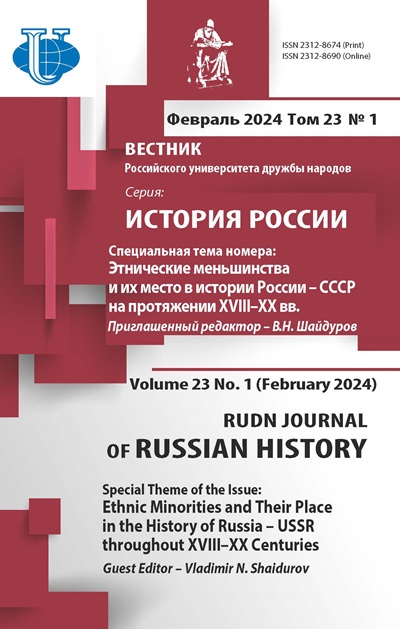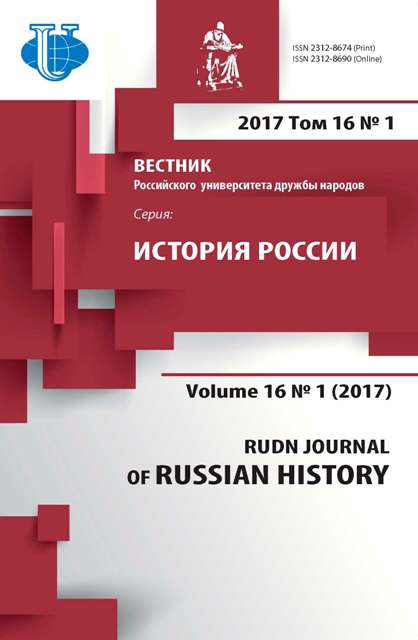ESTABLISHMENT OF FINANCIAL-INDUSTRIAL GROUPS IN RUSSIA AT THE TURN OF THE 20TH-21ST CENTURIES
- Authors: Lutoshkin S.A1
-
Affiliations:
- Peoples’ Friendship University of Russia (RUDN University)
- Issue: Vol 16, No 1 (2017)
- Pages: 70-80
- Section: SOCIO-ECONOMIC AND POLITICAL HISTORY OF RUSSIA
- URL: https://journals.rudn.ru/russian-history/article/view/15762
- DOI: https://doi.org/10.22363/2312-8674-2017-16-1-70-80
Cite item
Full text / tables, figures
Abstract
Thе article deals with the process of creating financial-industrial groups (FIGs) in the Russian Federation at the turn of the 20th - 21stcenturies. It analyzes the historical specificity of the formation of large industrial and financial associations in the post-Soviet period. The structure and mechanism of FIGs functioningare considered there. The author shows in detail the main stages of FIGs development, which were caused by the objective economic and political processes in the country. Despite the fact that all modern Russian industrial and financial associations appeared in the post-Soviet period, under the conditions of the USSR planned economy there was amassed some experience of construction and operation of large associations within the Soviet ministries of gas, aviation, automotive and other industries. In their scope and forms they resembled Western corporate structures. It was suchan industrial base which formed the basis of Russian FIGs. There are bright examples of creating Russian fi nancial-industrial groups on the basis of the former Soviet sectoral ministries -“Lukoil” and “Gazprom”. Among other things, FIGs were based on large commercial banks,that is public and private associations. Besides, the article describes the regional and interstate financial and industrial groups, as well as public corporations, which appeared in the 2000s. Within a relatively short period of time, Russian FIGs managed to pass a difficult path from the simplest corporate structures to diversified financial-industrial associations. At the turn of the 2010s, it was the state policy in the field of FIGs which largely influenced the future of the Russian economy, its opportunity to “fit” in the world balance of forces in the conditions of the sanctions declared by the West, and, to some extent, Russia’s formation of the direction and essence of perspective macroeconomic processes of globalization. In the difficult economic conditions, FIGs became a donor of funds for the Russian economy.
About the authors
Sergei A Lutoshkin
Peoples’ Friendship University of Russia (RUDN University)
Author for correspondence.
Email: moto-man@mail.ru
6 Miklukho-Maklaya St., Moscow, Russia, 117198
References
- Pappe Ya.Sh. «Oligarkhi»: Ekonomicheskaya khronika, 1992−2000. Moscow, 2000.
- Grebenichenko S.F. Kuda i pochemu idet Rossiya? Sotsiologicheskie issledovaniya. 1999; 7:33−43 (in Russian).
- Grebenichenko S.F. K obnovleniyu Rossii! Aktual’nye problemy prepodavaniya gumanitarnykh nauk v vysshei shkole. Sbornik nauchnykh trudov. Moscow, 2012, pp. 65−75 (in Russian).
- Grebenichenko D.K., Grebenichenko S.F. Consumer expectations: Russia has a long way to go. Sotsiologicheskie issledovaniya. 1998; 2:31−42.
- Chernikov G.P, Chernikova D.A. Lyudi i vlast’. Kto vladeet Rossiei? Moscow, 1998 (in Russian).
- Grebenichenko S.F., Davydov V.P. Putinskaya Rossiya. Moscow, 2007 (in Russian).
- Davydov V.P., Grebenichenko S.F. Mirovoi krizis: «chuzhie» tseli i interesy Rossii. Sotsial’nogumanitarnyeznaniya. 2009; 2:19−44 (in Russian).
- Il'in M.S., Tikhonov A.G. Finansovo-promyshlennaya integratsiya i korporativnye struktury: mirovoi opyt i realii Rossii. Moscow, 2002 (in Russian).
- Peregudov S.P., Lapina N.Yu., Semenenko I.S. Gruppy interesov i rossiiskoe gosudarstvo. Moscow; 1999 (in Russian).
- Oleinik T.V. Gosudarstvo i formirovanie vedushchikh finansovo-promyshlennykh grupp Rossii (1993−1997 gg.): k istokam vzaimootnoshenii. Vestnik Chuvashskogo universiteta. 2009; 3:118−123 (in Russian).
- Kurbatova M.V., Kislitsyn D.V. Integrirovannaya biznes-gruppa kak osnovnaya forma sushchestvovaniya rossiiskogo krupnogo biznesa. Vestnik KemGU. 2008; 2:238−244 (in Russian).
- Tsvetkov V.A. Spetsificheskie osobennosti natsional'noi modeli rynochnoi ekonomiki. Voprosy ekonomiki. 2010; 2:2−11 (in Russian).
- Khlebtsevich K.V. Oligarkhicheskii kapital i stanovlenie politicheskoi sistemy Rossiiskoi Federatsii (1993−1999 gg.). Naukaishkola. 2009; 6:77−78 (in Russian).
- Izmailova M.A. Istoricheskii i mirovozzrencheskii aspekty evolyutsii korporativnykh struktur. Nauchno-teoreticheskiizhurnal. 2013; 6:150−156 (in Russian).
- Prokopova O.V., Kurchenkov V.V. Tendentsiya razvitiya korporativnykh otnoshenii v rossiiskoi ekonomike. Regional'naya ekonomika. Yug Rossii. 2008; 9:154−163 (in Russian).
- Nikolaeva I.P., Krivopalov V.A. Finansovo-promyshlennaya oligarkhiya kak sotsial'noekonomicheskaya kategoriya, ee sushchnost', tseli i funktsii. Izvestiya Volgogradskogo gosudarstvennogo tekhnicheskogo universiteta. 2006; 5:44−50 (in Russian).
- Ashvanyan S.K. Transnatsionalizatsiya rossiiskogo kapitala. Ekonomicheskie nauki. 2004; 283:105−109 (in Russian).
- Belyaeva I.Yu., Eskindaov M.A. Kapital finansovo-promyshlennykh korporativnykh struktur: teoriya i praktika. Moscow; 2001 (in Russian).
- Mukhin A.A. Biznes-elita i gosudarstvennaya vlast’: Kto vladeet Rossiei na rubezhe vekov? Moscow, 2001 (in Russian).
- Grebenichenko S.F., Davydov V.P. Rossiya na puti v tsivilizatsiyu: problem i perspektivy. Politologicheskie ocherki. Chelyabinsk, 1992 (in Russian).
- Grebenichenko S.F. Kuda i pochemu idet Rossiya? Sotsiologicheskie issledovaniya. 1999; 7:33−43 (in Russian).
- Grebenichenko D.K., Grebenichenko S.F. Consumer expectations: Russia has a long way to go. Sotsiologicheskie issledovaniya. 1998; 2:31−42.
- Davydov V.P., Grebenichenko S.F. Mirovoi krizis: «chuzhie» tseli i interesy Rossii. Sotsial’no-gumanitarnyeznaniya. 2009; 2:19−44 (in Russian).
- Pappe Ya.Sh. «Oligarkhi»: Ekonomicheskaya khronika, 1992−2000. Moscow; 2000.
- Chernikov G.P, Chernikova D.A. Lyudiivlast’. Kto vladeet Rossiei? Moscow; 1998 (in Russian).
- Grebenichenko S.F., Davydov V.P. Putinskaya Rossiya. Moscow, 2007 (in Russian).
- Grebenichenko S.F. K obnovleniyu Rossii! Aktual’nye problemy prepodavaniya gumanitarnykh nauk v vysshei shkole. Sbornik nauchnykh trudov. Moscow, 2012, pp. 65−75 (in Russian).
















